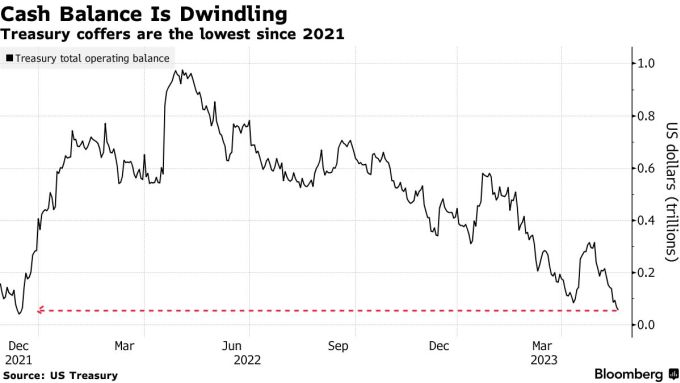The US government has only 57.3 billion USD left, the lowest level since the end of 2021, while negotiations between the White House and the Republican Party have not progressed.
The figure as of May 18 was down from $68.3 billion on May 17 and $140 billion from the end of last week. The U.S. government’s cash balance is under pressure due to Treasury Department measures to avoid exceeding the $31.4 trillion debt ceiling.
Meanwhile, as of May 17, the US Treasury had just $92 billion left in extraordinary measures to help the government pay its debts. That’s up from about $88 billion on May 10, but still just over a quarter of the $333 billion package. The package is extraordinary measures — such as the right to continue selling debt — to help the Treasury keep cash flowing.
Earlier this week, Treasury Secretary Janet Yellen reiterated to lawmakers that the extraordinary measures would no longer be in place by early June. On Thursday (May 18), she commented to the heads of major banks that failing to raise the debt ceiling would be “catastrophic” for the financial system.

US Government Cash Flow from 2021 to Present. Unit: Trillion USD.
Politicians expressed optimism on May 18 that a deal was imminent in negotiations between the White House and Republicans, with House Speaker McCarthy and Senate Majority Leader Chuck Schumer even planning to vote in the coming days on a bipartisan deal.
But by Friday morning (May 19), Republican representatives had left the closed-door meeting room just an hour after the latest round of negotiations began, raising doubts that the talks were backtracking.
Rep. Patrick McHenry, one of the negotiators, said he was not confident a deal could be reached by the end of the week, the deadline President Biden needs to pass a new debt ceiling bill before June 1.
Meanwhile, White House officials left the Capitol briefing room without promising to return. Negotiators said the breakdown in talks centered on disagreements over government budget cuts. House Speaker Kevin McCarthy said spending levels were a sticking point as Republicans pushed for deeper cuts than Democrats were willing to accept. Republicans also ruled out any proposed tax increases as a way to reduce the deficit.
"The White House has to move and we haven't seen that yet so let's pause the negotiations. We can't spend more money next year. We have to spend less than last year. That's pretty easy," Mr. McCarthy said on May 19.
At a press conference in Hiroshima, Japan, where Mr. Biden is attending the G7 summit, White House press secretary Karine Jean-Pierre confirmed that there were “serious differences” between negotiators. She said the White House would “work toward a reasonable, bipartisan solution” that could pass both houses of Congress.
White House communications director Ben LaBolt said Republican negotiators had delivered a version of the bill that barely softened the "extreme" budget cuts. "Republicans are holding the economy hostage and pushing us to the brink of default," he said.
In Hiroshima on Saturday (May 20), President Biden said he was “not at all” worried about the negotiations and said they would move forward in stages. “I still believe that a default can be avoided,” he said. The US stock market appeared to be in a similar mood, with the three major indexes Dow Jones, S&P 500 and Nasdaq all ending the week in the green.
Phien An ( according to Bloomberg, WSJ )
Source link




































































































Comment (0)